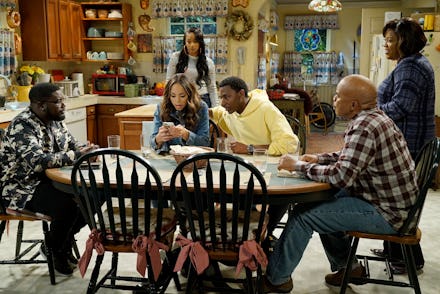'The Carmichael Show' tackles rape with risky and honest conversations in season 3 premiere

It's risky to use comedy as a lens to dissect the issue of rape and what constitutes sexual consent. There is nothing funny about sexual assault victims' road to recovery, which can last a lifetime, and there are serious repercussions for those convicted. With this in mind, The Carmichael Show's attempt to navigate this discussion on the sitcom's season three premiere was bold. Although at many times uncomfortable, the episode held up a necessary mirror to how far our society has come and how far it needs to go in understanding why "yes means yes" — a California and New York law that calls for obtaining affirmative consent while engaging in sexual activity on college campuses — is the most important rule in sex.
What The Carmichael Show did well was reveal the role everyone plays in stopping — or further perpetuating — the commonly blurred lines of communication between people before engaging in any sexual activity. There was no holding back on this array of perspectives, even though some were cringeworthy.
The episode starts off with Bobby's single-man woes. As he sits at the dining-room table, he shares with the Carmichael family that his date from the night before, Natalie, isn’t returning his text messages. He also admits that he had a drunk hookup with her, which later drives his concern that he may not have received consent to have sex with her.
The conversation takes a heavy turn when Jerrod’s girlfriend, Maxine, shares that a friend has been raped and was posting her story using a Facebook hashtag "ItHappenedToMe," where there were over 100,000 posts. The moment recalls how in reality social media has been a major driving force in bringing to light the misconceptions around rape culture, with hashtags like "#YouOKSis," "#SurvivorPrivilege" and "#RapeCultureIsWhen," many created by women of color who were victims of rape and sexual assault themselves.
Initially, the family shows sympathy for Maxine's friend. But once Maxine reveals further details about the rape to the family members, they begin to judge whether the situation had actually been rape. Common fallacies on the topic are brought to the surface, including: the idea that rapists are only strangers to the victim they assault and "drag to an alley," and that rape is only rape if an individual says "No" or "Stop" during sex, while the other individual continues.
During the debate, Maxine makes the strongest case for considering the perspective of the victim. She says that in a perfect world, a woman should be able to break into someone’s house, pass out drunk and not have to worry about being sexually assaulted. She adds that society shouldn’t put the responsibility solely on women to be safe, and that boys need to be taught not to rape. She points to President Donald Trump's ability to become president after his own sexual assault accusations as proof that society doesn't take this issue seriously enough.
But Maxine is alone in her fight against Jerrod, his father and his mother — who all hold on to their ideals. Nekeisha, Bobby's estranged wife, remains mostly neutral. Maxine carries the burden of driving home the importance of consent, and because of this, could be portrayed and dismissed as the "angry feminist."
What helps balance this portrayal is Bobby's sincere concern that he may have raped his date the night before because he didn’t receive "a verbal yes" during their drunk hookup. He decides he wants to confront his date to be sure he hadn't harmed her. Although his parents and brother, Jerrod, coddle him with "you're a good guy" rhetoric and try to convince him that he couldn't have done anything wrong, it's clear he's taken Maxine's words to heart. He says he would much rather own up to his mistakes than run from them.
Although not perfect, The Carmichael Show gets props for giving space — on a national, mainstream platform — to the ongoing issue of rape and sexual consent, which normally gets overlooked. But what should have been pushed further, possibly through another character, was the idea that normalized sexual violence upon women is no laughing matter. More needs to be done so that the aforementioned hashtags and television episodes like this one will no longer be necessary for progress — as consent will have become the new norm.
Mic has ongoing arts coverage. Please follow our arts hub here.